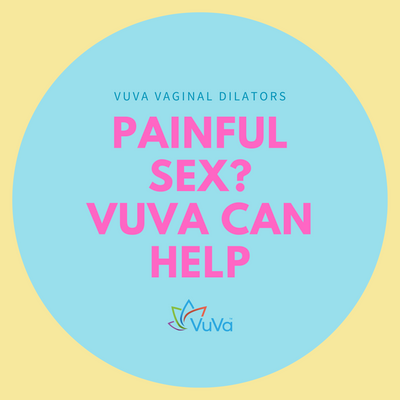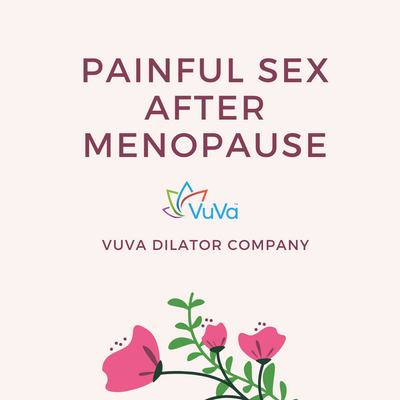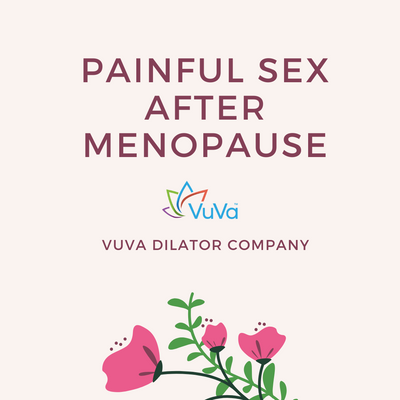
| Tara Langdale
How to Overcome Fear of Sex Pain: A Guide to Healing, Confidence & Connection
For many women, the idea of sexual intimacy brings not just anticipation or excitement — but fear, anxiety, and physical pain. If you're experiencing fear of sex or struggling with anxiety about intercourse, you're not alone. Millions of women across the world suffer in silence, afraid of intimacy due to discomfort, trauma, or uncertainty about what’s causing the pain.
But the good news is: there is hope.
With knowledge, support, and tools like VuVa Magnetic Dilators, overcoming sexual fear is possible.
In this guide, we’ll walk through why sex might be painful, how fear and anxiety tie into it, and most importantly — how you can begin to relax during sex, reduce your discomfort, and rebuild trust with your body and your partner.
Understanding the Fear of Painful Sex
Let’s name it for what it is:
The fear of sex is real — and it has a name. It can manifest as
Sexual intercourse phobia (genophobia or erotophobia)
Fear of painful sex (often related to a condition called dyspareunia)
Fear of genital pain
Sexual performance anxiety
Fear of intimacy or vulnerability
Sometimes, this fear starts after one painful sexual experience. Other times, it’s a slow buildup caused by underlying health issues, trauma, or emotional pressure. In all cases, it creates a feedback loop:
Anxiety → Muscle Tension → More Pain → More Fear
It’s not just in your head. It’s in your nervous system, your muscles, and your emotions. And understanding this cycle is the first step in breaking free from it.
Common Causes of Pain During Sex
If you’re experiencing pain during sex, it’s essential to understand what might be causing it. Here are the most common physical and emotional causes:
Vaginismus
Involuntary contraction of the vaginal muscles that makes penetration painful or impossible. Often triggered by fear, trauma, or negative beliefs about sex.
Vulvodynia
Chronic vulvar pain, often described as burning, stinging, or irritation.
Hormonal Changes
Menopause, birth control, and postpartum changes can lead to vaginal dryness, thinning, and discomfort.
Pelvic Floor Dysfunction
Overly tight pelvic muscles due to stress, posture, or trauma can cause deep or surface-level pain during intercourse.
Past Trauma
Emotional trauma or past abuse can manifest as physical resistance to sexual intimacy.
Medical Conditions
Endometriosis, interstitial cystitis, or infections can all lead to fear of genital pain during sex.
Understanding your body and its responses is key in developing compassion toward yourself and creating a healing plan.
How Anxiety About Intercourse Impacts Your Body
Sex and anxiety don’t mix well.
When you're afraid, your body enters a fight-or-flight response. This causes
Muscle tension (especially in the pelvic floor)
Shallow breathing
Vaginal dryness
Increased pain sensitivity
Emotional detachment or dissociation
This is why coping with sexual anxiety is just as important as addressing physical symptoms.
How to Overcome Fear of Sex Pain
If you’re ready to move forward with healing, here’s a step-by-step guide to help you overcome fear of sex pain — both emotionally and physically.
1. Acknowledge Your Fear Without Shame
It’s okay to be afraid.
It's okay to be confused.
You don’t have to “just push through it.” The first step in overcoming sexual fear is giving yourself permission to feel what you feel.
Write down your fears
Speak them out loud
Say to yourself: “My fear is valid, but it does not have to control me”
2. Educate Yourself on Painful Sex Causes
Knowledge is power — and it’s also soothing.
Learn about the different conditions that can cause painful sex. Understanding whether you have vaginismus, vulvodynia, or a hormonal issue will help you pursue the right treatment without guessing.
Talk to a pelvic floor physical therapist, OBGYN, or use at-home tools like VuVa Magnetic Dilators designed to support healing with evidence-based therapy.
3. Practice Gentle Body Desensitization
If your body associates sex with fear or pain, it may need gentle re-training.
VuVa Magnetic Dilators are an excellent way to ease your body back into trust and comfort. These dilators
Help stretch and relax the vaginal muscles
Increase blood flow through embedded therapeutic magnets
Reduce inflammation and nerve pain
Let you progress at your own pace, starting with small sizes
They’re not just tools — they’re a form of physical empowerment. You are in control. You decide the pace. And you are not alone.
Explore more at vuvatech.com
4. Learn How to Relax During Sex
Relaxation isn’t just a mental game — it’s physical. Here are calming strategies to help you feel safe and connected:
Deep breathing — Breathe into your belly to calm your nervous system
Use a safe word — Even with a partner you trust, having a signal gives you power
Start with non-penetrative touch — Massage, cuddling, and eye contact can rewire pleasure into your body
Use plenty of lube — Friction can intensify fear. Water-based or silicone lube is your friend
Explore movement or positions that feel less vulnerable — Side-lying or woman-on-top gives you more control
5. Work with Your Mind and Emotions
Mental healing is just as important. If you're stuck in a loop of sexual anxiety, consider
Therapy — A trauma-informed therapist can help unpack emotional triggers
Journaling — Write about what your fear feels like. Then write what safety and pleasure might feel like instead
Affirmations — “I am safe. My body is healing. I deserve comfort and connection.”
Visualization — Picture a safe, joyful experience with no pain or fear. This can help rewire your brain’s expectations
6. Talk to Your Partner (If You Have One)
If you're in a relationship, communication can reduce pressure and help you both feel more connected.
Let your partner know
This is not about them
You want intimacy, but need to go at your own pace
You may need breaks, gentle touch, or new approaches
Most partners want to help — they just need to know how.
7. Celebrate Progress — Not Perfection
Overcoming fear of sex is a journey, not a straight line. Some days will feel harder than others, but every step you take — even the smallest — is a victory.
Celebrate milestones like
Using a dilator for the first time
Identifying a fear trigger
Communicating with a partner
Feeling less pain than usual
Every win counts.
You're Not Alone — And You Can Heal
If you’ve been struggling with the fear of painful sex, it’s time to give yourself grace. You’re not “broken.” You’re not “frigid.” You’re not “too sensitive.”
You’re healing. You’re aware. And you’re doing the brave work of reclaiming your body and pleasure.
With tools like VuVa Magnetic Dilators, compassionate therapy, and self-love, you can break free from fear and find connection again.
Take the First Step Toward Healing
VuVa’s patented magnetic dilators are designed by women who have been there — and backed by pelvic therapists and doctors who know how to support you.
If you’re ready to say goodbye to pain, fear, and anxiety around intimacy, start your healing journey today.
Visit vuvatech.com to explore your options.
Because sex should feel safe, not scary.
Pleasure should feel possible, not painful.
And you deserve hope, healing, and happiness.














